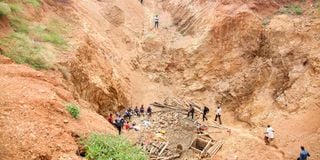Breaking News: At least 10 feared to have drowned in Makueni river
Revealed: Miners now cover up accidents after Abimbo gold mine tragedy

Residents mill around the mining site at Abimbo village in Sakwa Bondo, Siaya County where the body of a miner who had been trapped for nearly seven months was retrieved on June 26, 2022.
An investigation by Nation.Africa has established that miners in Siaya County no longer report accidents in collapsed mines and do everything possible to conceal them from authorities for fear of job losses and other repercussions.
As they struggle to shake off the nightmare of what happened at the Abimbo mines in 2021 where a mine caved in and killed two miners after trapping 10, artisanal workers in Siaya County have become secretive about their activities.
In what turned out to be a painstaking search for their trapped colleague, it took the miners 205 days before they could trace and retrieve the body of Tom Okwach from the collapsed mine and hand it to members of his family for burial.
The search for the missing miner at Abimbo lasted seven months.
Also read: Relief as man trapped in caved mine rescued
The accident at the mine highlighted the poor working conditions and the risks miners exposed themselves to while going about their day to day activities in search of a livelihood.
It is now emerging that several accidents have happened at gold mines in Gem, Rarieda, Alego Usonga, Ugunja and Ugenya sub-counties since, but miners are choosing not to report them to authorities or discuss what has happened to their colleagues.
Artisanal miners told Nation.Africa that they were keen not to report over fears that the mines could be closed by authorities and deny them a livelihood.
One of the miners at the Siranga mines in Ugenya Sub-County said several of their colleagues had been involved in accidents lately but the happennings have gone unreported.
In one such incident at Siranga, a group miners carried the body of their colleague who had died in the mine on a boda boda motorbike at night and delivered it to the mortuary.
“In December last year and early January, we lost two of our colleagues in separate accidents. Our officials agreed to keep the matter secret lest the authorities learnt about it, and closed the mines,” said the miner who requested not to be named.
He said: “We carried the body at night on a boda boda motorbike to a public health facility and notified close relatives of the accident. Burial arrangements were hurriedly made and the body was interred.”
Another miner died days later after the shaft collapsed and he was buried with other two people.
“Two people survived the accident, unfortunately a miner lost his life. We also carried him like a sick person to the facility and informed the family members. When we reached the hospital he was booked as a sick man then later was declared dead on arrival,” he said.
Another miner at K'ogelo mines in Alego Usonga said: “When there are deaths, we quickly inform family members and close relatives, who are also aware of the dangers associated with artisanal mining. People have not stopped driving or travelling because there are accidents along the highways, miners face similar risks."
This new conspiracy of silence by the miners is meant to keep away the authorities when things go wrong during the mining operations.
The 45 year-old miner, who has been working in the mines for the last 20 years said they are forced to cover up the accidents so as not to disrupt their only source of livelihoods in the mines.
“We are sometimes forced to lie about the cause of death of our colleagues since this could lead to closure of the mines,” said the miner.
But Mr Odhiambo Odari, the chairman of the Wuyawi Gold Mining Cooperative Society in Bondo Sub County disputed the accounts by his colleagues.
He said the incidents were usually reported to police and family members notified in the event of deaths of their kin working in the mines.
“Some of the miners have died while being treated in hospitals after they were involved in accidents in the mines,” said Mr Odari.
“Controlling artisanal mining is a daunting task in Siaya County and other parts of the country because there is no law that regulates the activities. The miners pay taxes to county government but the devolved units have done little to improve safety and equip them to carry out their activities in safe environments,” said Mr Odari.
Ugenya Sub County Police Commander Bernard Wamugunda said the Siranga gold mines had been closed down for security reasons.
“No death that has been reported at Siranga gold mines. The operations have been stopped at the mines on grounds of keeping the miners safe. The area is not fenced and National Environmental Management Authority (NEMA) has not authorized the mining activities,” said the police boss.
On the deaths that occur at the mining sites, Mr Odari says in most cases victims die while undergoing treatment.
Mr Odari called on the government to protect the industry, saying over 100,000 people are employed directly in the gold mines in Siaya County.
“Artisanal mining began in 1982 and since the activities are not regulated, we cannot be issued with permits. As artisanal miners we also engage in different community activities like building schools and paying school fees to the needy students in the society,” said Mr Odari.
Kisumu Regional Mining Officer Ben Bera said there plans to introduce regulations to enhance the safety of artisanal miners.
“Such cases of not reporting deaths at the mines are rampant because the mine field owners don’t want negative publicity. Today, there are people who open up mining pits just because the neighbour owns one and this makes it difficult to regulate their activities. We need to come up with regulations to restore sanity in the sector,” said Mr Bera.





